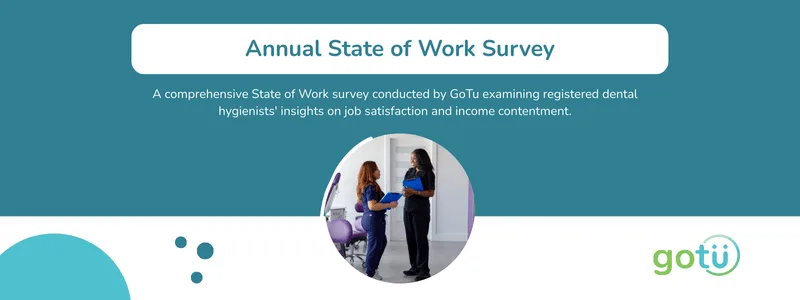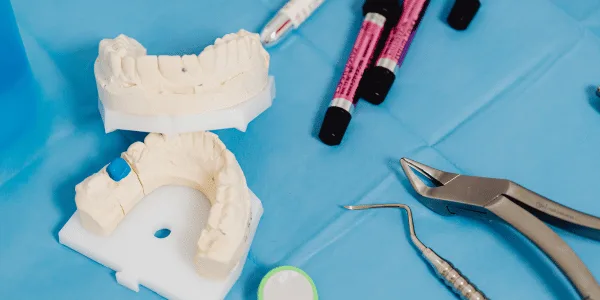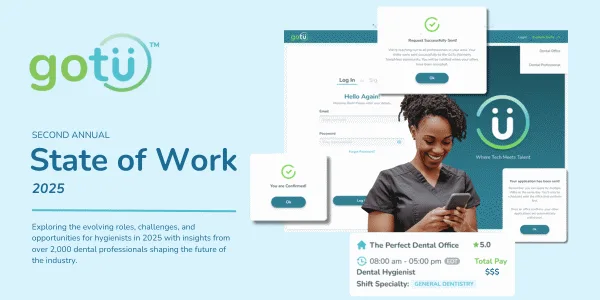Every year, GoTu conducts a State of Work survey to capture the realities of dental professionals and highlight industry trends. This first edition was conducted in 2023 and represents the beginning of our commitment to tracking how the profession is evolving. While these results reflect our first year of insights, they uncover important patterns about income satisfaction, job flexibility, burnout, and the benefits professionals want most.
Dental hygienists are the backbone of oral health care, but how do they really feel about their work, pay, and future in the profession? GoTu’s First Annual State of Work Survey dives deep into the experiences of more than 700 registered dental hygienists across the United States. The findings reveal eye-opening insights about compensation, workplace satisfaction, and the growing role of temporary work in the field
Who Took the Survey?
The survey captured responses from dental hygienists of all ages and career stages. Most respondents were between 25 and 44 years old, which mirrors national averages for the profession. A large portion of participants had over 10 years of experience, showing that seasoned professionals were eager to share their perspectives.
Income and Financial Insights
One of the clearest takeaways from the survey is the growing frustration with pay.
-
Hourly Pay: The most common wage reported was $41–$50 per hour, higher than the $37.13 national average recorded by the Bureau of Labor Statistics in 2019. This shows wages are climbing, but not everyone feels the increase matches the demands of the job.
-
Satisfaction Levels: Nearly 60% rated their income satisfaction at just 3 out of 5 stars, with none rating it higher than that.
-
Raises and Bonuses: Two out of three hygienists said they have not received a raise in the past 24 months, and bonuses remain uncommon.
Temporary work stands out as a financial game-changer. Hygienists who pick up temporary shifts report earning about $10 more per hour than their counterparts who work only permanent roles.
Career Paths and Job Changes
Despite frustrations with pay, most hygienists are committed to their profession. Over 60% said they have never considered leaving the dental field. Still, 41% are actively considering a job change, with higher income, better benefits, and greater flexibility being the main motivators.
Temporary work is becoming a popular option here, too. Of those who have tried temping, 89% listed pay rate as their top reason, followed closely by proximity to home, flexible schedules, and the need for extra income.
Burnout and Work-Life Balance
Burnout continues to be a major challenge in dental hygiene. The survey found that 65.7% of hygienists have experienced burnout at some point in their careers.
When asked how they cope, the most common strategies included:
- Spending time with family and friends
- Practicing self-care routines
- Taking vacations
- Staying active with regular exercise
Interestingly, hygienists who have never worked temporary shifts reported higher rates of burnout compared to those who have. This suggests that the flexibility and financial boost of temping may help prevent exhaustion.
Benefits and Insurance Gaps
any hygienists are not receiving the benefits they want or need:
-
Only 50% reported having health insurance through their employer
-
Just 39% receive retirement savings plans
-
Fewer than 27% have paid time off
-
Almost 90% do not have malpractice insurance.
This lack of benefits is one reason why many hygienists are open to alternative work models like temporary or flexible employment through platforms such as GoTu.
Interpersonal and Workplace Challenges
While income and benefits dominate the conversation, interpersonal issues also affect satisfaction. About 20% of hygienists reported communication or collaboration challenges with other dental professionals. RDH Magazine has noted a broader trend in which rising wages don’t always translate to higher job satisfaction, pointing to workplace culture as another factor that can’t be ignored.
What This Means for the Future of Dental Hygiene
The results of GoTu’s survey highlight a profession in transition. Dental hygienists are:
- Earning more per hour, but still dissatisfied with overall compensation
- Seeking flexibility and control, making temporary work more attractive
- Struggling with burnout, but finding relief through better balance and choice
- Wanting stronger benefits, particularly health coverage and retirement savings
For dental offices, this means that retention strategies need to go beyond pay. Providing flexibility, fostering supportive workplace cultures, and offering meaningful benefits will be essential to keep hygienists engaged and satisfied.
For professionals, temping is proving to be not just a short-term fix but a viable career strategy. With higher pay and more control over schedules, many hygienists are finding freedom and balance that traditional employment models can’t always provide.
Final Thoughts
GoTu’s Annual State of Work Survey 2024 makes one thing clear: dental hygienists love their profession, but they’re calling for change. From fairer pay to flexible options and better benefits, the industry has room to grow. At the same time, platforms like GoTu are helping hygienists take control of their careers while giving dental offices new ways to stay supported.
The dental hygiene workforce is resilient, dedicated, and ready for the future, and surveys like this ensure their voices are heard.







